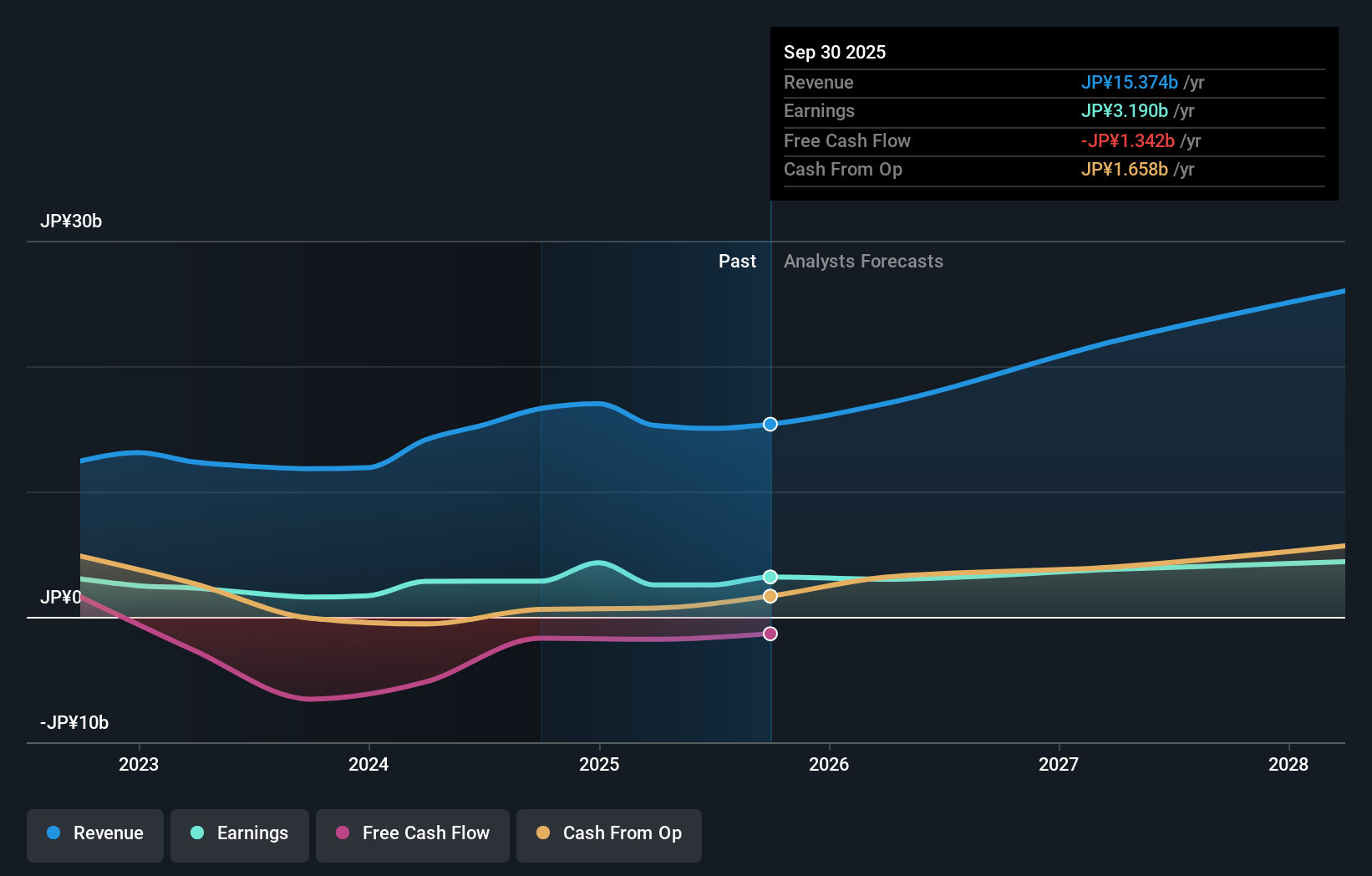- Japan
- /
- Telecom Services and Carriers
- /
- TSE:4390
IPS, Inc.'s (TSE:4390) most bullish insider, CEO Koji Miyashita must be pleased with the recent 13% gain
Key Insights
- IPS' significant insider ownership suggests inherent interests in company's expansion
- A total of 2 investors have a majority stake in the company with 51% ownership
- Institutional ownership in IPS is 15%
Every investor in IPS, Inc. (TSE:4390) should be aware of the most powerful shareholder groups. With 55% stake, individual insiders possess the maximum shares in the company. In other words, the group stands to gain the most (or lose the most) from their investment into the company.
As a result, insiders were the biggest beneficiaries of last week’s 13% gain.
In the chart below, we zoom in on the different ownership groups of IPS.
See our latest analysis for IPS

What Does The Institutional Ownership Tell Us About IPS?
Institutions typically measure themselves against a benchmark when reporting to their own investors, so they often become more enthusiastic about a stock once it's included in a major index. We would expect most companies to have some institutions on the register, especially if they are growing.
We can see that IPS does have institutional investors; and they hold a good portion of the company's stock. This implies the analysts working for those institutions have looked at the stock and they like it. But just like anyone else, they could be wrong. If multiple institutions change their view on a stock at the same time, you could see the share price drop fast. It's therefore worth looking at IPS' earnings history below. Of course, the future is what really matters.

We note that hedge funds don't have a meaningful investment in IPS. The company's CEO Koji Miyashita is the largest shareholder with 43% of shares outstanding. Resona Asset Management Co., Ltd. is the second largest shareholder owning 7.8% of common stock, and Masakatsu Tanaka holds about 3.0% of the company stock.
A more detailed study of the shareholder registry showed us that 2 of the top shareholders have a considerable amount of ownership in the company, via their 51% stake.
Researching institutional ownership is a good way to gauge and filter a stock's expected performance. The same can be achieved by studying analyst sentiments. While there is some analyst coverage, the company is probably not widely covered. So it could gain more attention, down the track.
Insider Ownership Of IPS
The definition of company insiders can be subjective and does vary between jurisdictions. Our data reflects individual insiders, capturing board members at the very least. Company management run the business, but the CEO will answer to the board, even if he or she is a member of it.
I generally consider insider ownership to be a good thing. However, on some occasions it makes it more difficult for other shareholders to hold the board accountable for decisions.
It seems that insiders own more than half the IPS, Inc. stock. This gives them a lot of power. So they have a JP¥23b stake in this JP¥43b business. Most would be pleased to see the board is investing alongside them. You may wish todiscover (for free) if they have been buying or selling.
General Public Ownership
The general public-- including retail investors -- own 29% stake in the company, and hence can't easily be ignored. This size of ownership, while considerable, may not be enough to change company policy if the decision is not in sync with other large shareholders.
Next Steps:
It's always worth thinking about the different groups who own shares in a company. But to understand IPS better, we need to consider many other factors. Consider risks, for instance. Every company has them, and we've spotted 1 warning sign for IPS you should know about.
If you are like me, you may want to think about whether this company will grow or shrink. Luckily, you can check this free report showing analyst forecasts for its future.
NB: Figures in this article are calculated using data from the last twelve months, which refer to the 12-month period ending on the last date of the month the financial statement is dated. This may not be consistent with full year annual report figures.
New: AI Stock Screener & Alerts
Our new AI Stock Screener scans the market every day to uncover opportunities.
• Dividend Powerhouses (3%+ Yield)
• Undervalued Small Caps with Insider Buying
• High growth Tech and AI Companies
Or build your own from over 50 metrics.
Have feedback on this article? Concerned about the content? Get in touch with us directly. Alternatively, email editorial-team (at) simplywallst.com.
This article by Simply Wall St is general in nature. We provide commentary based on historical data and analyst forecasts only using an unbiased methodology and our articles are not intended to be financial advice. It does not constitute a recommendation to buy or sell any stock, and does not take account of your objectives, or your financial situation. We aim to bring you long-term focused analysis driven by fundamental data. Note that our analysis may not factor in the latest price-sensitive company announcements or qualitative material. Simply Wall St has no position in any stocks mentioned.
About TSE:4390
IPS
Provides IT and telecommunications services in Japan and the Philippines.
Reasonable growth potential with proven track record.
Similar Companies
Market Insights
Community Narratives




